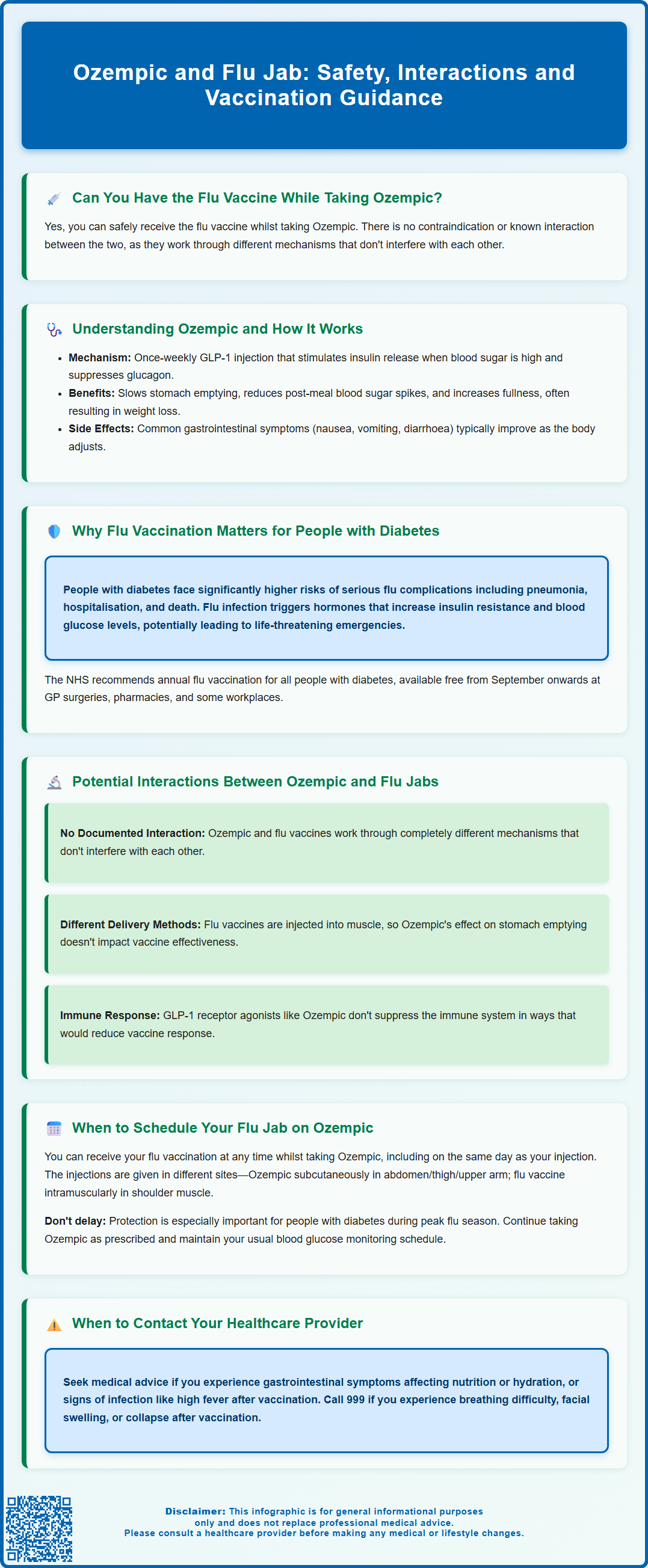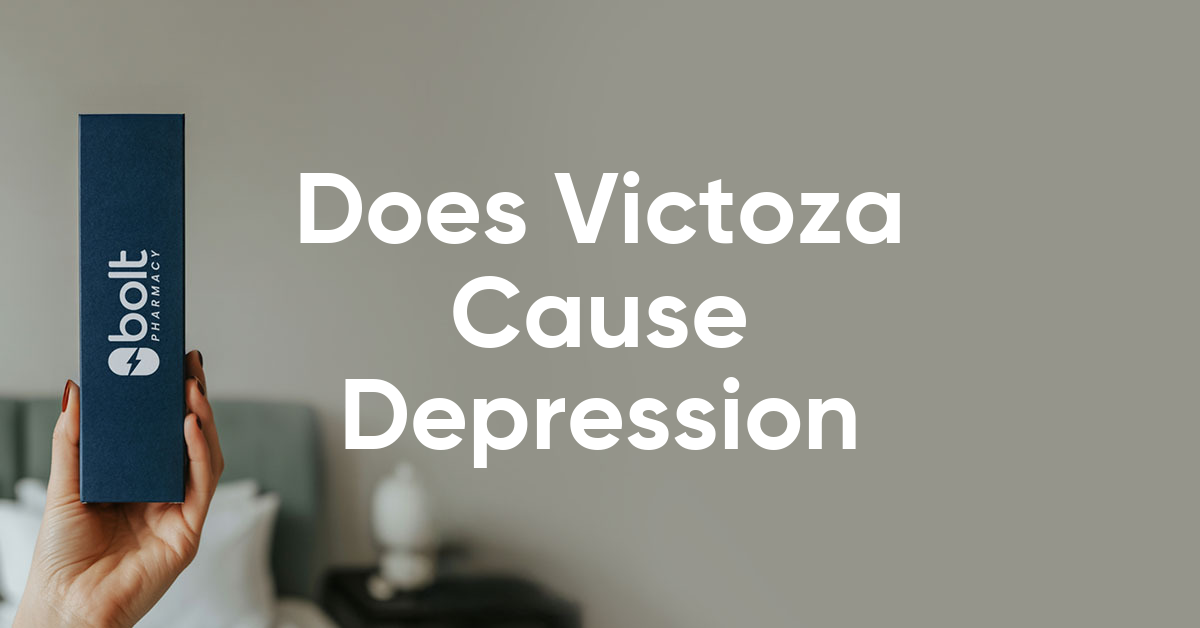Many people with type 2 diabetes taking Ozempic (semaglutide) wonder whether they can safely receive their annual flu jab. The good news is that there is no contraindication between Ozempic and the influenza vaccine—you can have both without concern. In fact, the NHS actively encourages all individuals with diabetes to receive their flu vaccination annually, as they face increased risks of serious complications from influenza. This article explains why the flu jab is particularly important for people taking Ozempic, addresses common concerns about potential interactions, and provides practical guidance on scheduling your vaccination whilst managing your diabetes medication regimen.
Summary: You can safely receive the flu vaccine whilst taking Ozempic, as there is no contraindication or interaction between semaglutide and influenza vaccination.
- Ozempic is a GLP-1 receptor agonist that works by stimulating glucose-dependent insulin secretion and slowing gastric emptying, mechanisms that do not interfere with vaccine efficacy.
- People with diabetes are a priority group for annual flu vaccination due to increased risk of serious complications including hospitalisation and metabolic decompensation.
- The flu vaccine and Ozempic can be administered on the same day without safety concerns, as they work through entirely different mechanisms.
- Common Ozempic adverse effects include gastrointestinal symptoms, whilst rare serious effects include pancreatitis and gallbladder disease requiring immediate medical attention.
- Continue your usual Ozempic dosing schedule and blood glucose monitoring when receiving the flu jab, and report any suspected adverse effects through the MHRA Yellow Card scheme.
Table of Contents
Can You Have the Flu Vaccine While Taking Ozempic?
Yes, you can safely receive the flu vaccine whilst taking Ozempic (semaglutide). There is no contraindication or known interaction between Ozempic and the seasonal influenza vaccination. The NHS and UK Health Security Agency (UKHSA) actively encourage people with type 2 diabetes and those at increased risk of complications to receive their annual flu jab, regardless of their diabetes medication regimen.
Ozempic is a glucagon-like peptide-1 (GLP-1) receptor agonist used for managing type 2 diabetes. The flu vaccine works by stimulating your immune system to produce antibodies against influenza viruses. These two mechanisms operate independently, and there is no evidence to suggest that Ozempic interferes with vaccine efficacy or that the flu jab affects Ozempic's glucose-lowering properties.
People with diabetes are considered a priority group for flu vaccination due to their increased risk of serious complications from influenza, including hospitalisation and worsening glycaemic control during illness. The NHS recommends that all individuals with diabetes receive their flu jab annually, typically from September onwards through the autumn and winter months, though vaccination later in the season still provides valuable protection.
If you have concerns about receiving the flu vaccine whilst on Ozempic, discuss these with your GP or practice nurse. They can provide personalised advice based on your medical history and current health status. It is important not to delay or avoid vaccination due to unfounded concerns about drug interactions, as the benefits of flu protection far outweigh any theoretical risks for people taking Ozempic.

Understanding Ozempic and How It Works
Ozempic (semaglutide) is a once-weekly injectable medication belonging to the GLP-1 receptor agonist class. It mimics the action of glucagon-like peptide-1, a naturally occurring hormone that plays a crucial role in glucose regulation and appetite control. The medication works through several complementary mechanisms to improve glycaemic control in adults with type 2 diabetes.
Primarily, Ozempic stimulates insulin secretion from pancreatic beta cells in a glucose-dependent manner—meaning it only triggers insulin release when blood glucose levels are elevated. This reduces the risk of hypoglycaemia when used alone. Simultaneously, it suppresses glucagon secretion, a hormone that raises blood glucose by promoting hepatic glucose production. By modulating both insulin and glucagon, Ozempic helps maintain more stable blood sugar levels throughout the day.
Additionally, Ozempic slows gastric emptying, which means food moves more slowly from the stomach into the small intestine. This effect helps reduce post-meal glucose spikes and contributes to increased satiety, often leading to reduced calorie intake and weight loss. Many patients experience weight reduction whilst taking Ozempic, which can further improve insulin sensitivity and overall metabolic health.
Common adverse effects include gastrointestinal symptoms such as nausea, vomiting, diarrhoea, and constipation, particularly when initiating treatment or increasing the dose. These effects typically diminish over time as the body adjusts. More serious but rare adverse effects include pancreatitis, gallbladder disease (cholelithiasis and cholecystitis), diabetic retinopathy complications (particularly in those with pre-existing retinopathy), and potential thyroid C-cell tumours (observed in animal studies). When used with insulin or sulfonylureas, there is an increased risk of hypoglycaemia, and dose reduction of these medications may be needed. Patients should be counselled about recognising symptoms of pancreatitis or gallbladder disease—severe, persistent abdominal pain, possibly with jaundice or fever—and instructed to seek immediate medical attention if these occur. Regular monitoring and dose titration according to the SmPC help optimise therapeutic benefits whilst minimising adverse effects.
Flu Vaccination Recommendations for People with Diabetes
The NHS and UK Health Security Agency (UKHSA) strongly recommend annual influenza vaccination for all individuals with diabetes, regardless of age or type of diabetes. This recommendation is based on substantial evidence demonstrating that people with diabetes face significantly higher risks of serious complications from influenza infection, including pneumonia, hospitalisation, and death. Influenza can also cause acute metabolic decompensation, making blood glucose control more challenging during illness.
During an influenza infection, the body's stress response triggers the release of counter-regulatory hormones such as cortisol and adrenaline, which increase insulin resistance and raise blood glucose levels. This physiological response can lead to hyperglycaemia, even in individuals whose diabetes is usually well controlled. Conversely, reduced appetite and food intake during illness may increase the risk of hypoglycaemia, particularly in those taking insulin or sulfonylureas. These metabolic disturbances can precipitate diabetic ketoacidosis (DKA) in type 1 diabetes or hyperosmolar hyperglycaemic state (HHS) in type 2 diabetes, both of which are medical emergencies.
The seasonal flu vaccine is typically offered from September onwards each year. People with diabetes should aim to receive their vaccination early in the flu season to ensure optimal protection before influenza begins circulating widely in the community. The vaccine is available free of charge on the NHS for all individuals with diabetes, and can be administered at GP surgeries, pharmacies offering NHS vaccination services, and some workplaces.
The standard quadrivalent inactivated influenza vaccine is appropriate for most adults with diabetes. For those aged 65 and over, an adjuvanted vaccine (aQIV) may be offered, which produces a stronger immune response. Children with diabetes typically receive the live attenuated intranasal vaccine (LAIV) unless contraindicated. There are no special precautions or modifications required for people taking diabetes medications, including Ozempic, when receiving the flu jab. If you have previously experienced a severe allergic reaction to a flu vaccine or any of its components, inform your healthcare provider, who can assess suitability and discuss alternative options if necessary. Seek urgent medical help (call 999) if you experience severe allergic reactions such as breathing difficulty, facial swelling, or collapse after vaccination.
Potential Interactions Between Ozempic and Flu Jabs
There is no documented interaction between Ozempic and the influenza vaccine. The mechanisms of action of these two interventions are entirely distinct and do not interfere with one another. Ozempic works by modulating glucose-dependent insulin secretion and slowing gastric emptying, whilst the flu vaccine stimulates adaptive immune responses to produce protective antibodies against influenza viruses. Neither affects the pharmacokinetics or pharmacodynamics of the other.
It's worth noting that Ozempic's effect on slowing gastric emptying only impacts orally administered medications and nutrients. Since vaccines are administered by injection (intramuscularly for standard flu vaccines), the delayed gastric emptying caused by Ozempic has no impact on vaccine absorption or effectiveness.
Some patients may wonder whether Ozempic's effects on the immune system could theoretically alter vaccine efficacy. Current evidence does not suggest that GLP-1 receptor agonists have clinically significant immunosuppressive properties that would impact vaccination responses, though specific studies with influenza vaccines are limited.
It is worth noting that some individuals may experience mild, transient side effects following flu vaccination, such as soreness at the injection site, low-grade fever, or muscle aches. These are normal immune responses and typically resolve within 24–48 hours. These vaccine-related effects should not be confused with Ozempic's known adverse effects, such as nausea or gastrointestinal discomfort. If you experience new or worsening symptoms after receiving your flu jab whilst taking Ozempic, consider the timing and nature of symptoms to help identify the likely cause.
Very rarely, acute illness or significant physiological stress might temporarily affect blood glucose control. Patients should continue their usual diabetes monitoring and maintain their Ozempic dosing schedule as prescribed. If you develop persistent vomiting, severe abdominal pain, or difficulty maintaining adequate hydration following vaccination, contact your GP or NHS 111 for advice. You may need to follow local diabetes sick-day rules, which might include temporarily withholding Ozempic if you cannot maintain adequate fluid intake. However, such scenarios are exceptionally rare and should not deter you from receiving your recommended flu vaccination.
When to Schedule Your Flu Jab on Ozempic
You can receive your flu vaccination at any time whilst taking Ozempic—there is no need to adjust the timing of either your Ozempic injection or your flu jab. The two can be administered on the same day without any safety concerns or reduced efficacy. If you prefer to separate them for personal comfort or to more easily identify the source of any mild side effects, this is also perfectly acceptable, though not medically necessary.
Many patients find it convenient to schedule their flu vaccination during a routine appointment at their GP surgery or diabetes clinic. If you are due for your Ozempic injection on the same day as your flu jab appointment, you can proceed with both. The injections are administered in different sites (Ozempic subcutaneously in the abdomen, thigh, or upper arm; flu vaccine intramuscularly in the deltoid muscle of the upper arm), so there is no issue with local tissue reactions or absorption.
Given the importance of timely flu vaccination, particularly for people with diabetes, it is generally advisable not to delay your flu jab during peak flu season. The protection offered by the vaccine is particularly important for people with diabetes, and there is no medical reason to delay vaccination because you are taking Ozempic.
Practical considerations include ensuring you are well hydrated on the day of vaccination, as this may help you feel more comfortable. Continue taking Ozempic exactly as prescribed—do not skip or delay your dose due to receiving the flu vaccine. Maintain your usual blood glucose monitoring schedule, as this allows you to identify any changes in glycaemic control, whether related to the vaccine, your medication, or other factors.
If you experience gastrointestinal symptoms that make it difficult to maintain adequate nutrition or hydration, or if you develop signs of infection such as high fever or severe malaise following vaccination, contact your healthcare provider for guidance. Remember that serious adverse reactions to flu vaccines are extremely rare, and the protective benefits for people with diabetes are substantial. Your GP, practice nurse, or pharmacist can answer any specific questions about timing your flu vaccination whilst taking Ozempic.
If you suspect you have experienced side effects from either Ozempic or the flu vaccine, you can report these through the MHRA Yellow Card scheme at yellowcard.mhra.gov.uk.
Scientific References
Frequently Asked Questions
Can I have my Ozempic injection and flu jab on the same day?
Yes, you can receive both your Ozempic injection and flu vaccination on the same day without any safety concerns. The injections are administered in different sites and do not interfere with each other's effectiveness.
Will Ozempic affect how well the flu vaccine works?
No, Ozempic does not affect flu vaccine efficacy. The two work through completely different mechanisms—Ozempic modulates glucose control whilst the flu vaccine stimulates immune responses to produce protective antibodies against influenza viruses.
Why is the flu jab particularly important for people taking Ozempic?
People taking Ozempic typically have type 2 diabetes, which places them at significantly higher risk of serious flu complications including pneumonia, hospitalisation, and metabolic decompensation. The NHS recommends annual flu vaccination for all individuals with diabetes regardless of their medication regimen.
The health-related content published on this site is based on credible scientific sources and is periodically reviewed to ensure accuracy and relevance. Although we aim to reflect the most current medical knowledge, the material is meant for general education and awareness only.
The information on this site is not a substitute for professional medical advice. For any health concerns, please speak with a qualified medical professional. By using this information, you acknowledge responsibility for any decisions made and understand we are not liable for any consequences that may result.
Heading 1
Heading 2
Heading 3
Heading 4
Heading 5
Heading 6
Lorem ipsum dolor sit amet, consectetur adipiscing elit, sed do eiusmod tempor incididunt ut labore et dolore magna aliqua. Ut enim ad minim veniam, quis nostrud exercitation ullamco laboris nisi ut aliquip ex ea commodo consequat. Duis aute irure dolor in reprehenderit in voluptate velit esse cillum dolore eu fugiat nulla pariatur.
Block quote
Ordered list
- Item 1
- Item 2
- Item 3
Unordered list
- Item A
- Item B
- Item C
Bold text
Emphasis
Superscript
Subscript












